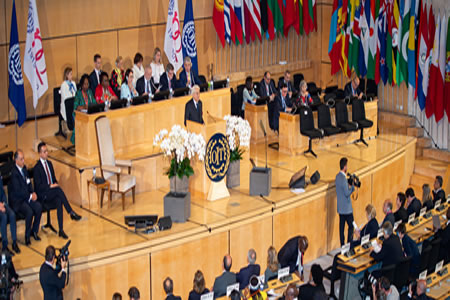The Government, Employers and Workers Groups at the 108th Centenary Session of the International Labour Conference have jointly adopted a new convention and recommendation to end violence and harassment in the workplace.
The Violence and Harassment Convention, 2019, and the Violence and Harassment Recommendation, 2019, were adopted by delegates on the final day of the Centenary International Labour Conference, in Geneva.
For the convention, 439 votes were cast in favour, seven against, with 30 abstentions. The recommendation was passed with 397 votes in favour, 12 votes against and 44 abstentions.
The convention recognises that violence and harassment in the world of work “can constitute a human rights violation or abuse and is a threat to equal opportunities, is unacceptable and incompatible with decent work.”
The convention defines “violence and harassment” as behaviours, practices or threats “that aim at, or are likely to result in physical, psychological, sexual or economic harm.”
It reminds member states that they have a responsibility to promote a “general environment of zero tolerance.”
The new international labour standard aims to protect workers and employees, irrespective of their contractual status and includes persons in training, interns and apprentices, workers whose employment has been terminated, volunteers, job seekers and job applicants. It recognises that “individuals exercising the authority, duties or responsibilities of an employer” can also be subjected to violence and harassment.
The standard covers violence and harassment occurring in the workplaces where a worker is paid, takes a rest or meal break, or uses sanitary, washing or changing facilities, during work-related trips, travel, training, events or social activities, work-related communications (including through information and communication technologies), in employer-provided accommodation; and when commuting to and from work. It also recognises that violence and harassment may involve third parties.
ILO Director-General, Guy Ryder welcomed the adoption. “The new standards recognize the right of everyone to a world of work free from violence and harassment,” he said.
The next step, according to Ryder, is to put these protections into practice, “so that we create a better, safer, decent, working environment for women and men. I am sure that, given the co-operation and solidarity we have seen on this issue, the public demand for action, we will see speedy and widespread ratifications and action to implement.”
Manuela Tomei, Director of the ILO’s Workquality Department, said: “ Without respect, there is no dignity at work, and, without dignity, there is no social justice. This is the first time that a Convention and Recommendation on violence and harassment in the world of work have been adopted. We now have an agreed definition of violence and harassment. We know what needs to be done to prevent and address it, and by whom. We hope these new standards will lead us into the future of work we want to see.”
The Convention will enter into force 12 months after two member States have ratified it. The Recommendation, which is not legally binding, provides guidelines on how the Convention could be applied.
This is the first new Convention agreed by the International Labour Conference since 2011, when the Doledtic Workers Convention, 2011 (No. 189) was adopted.
Conventions are legally binding international instruments, while
Recommendations provide advice and guidance.






